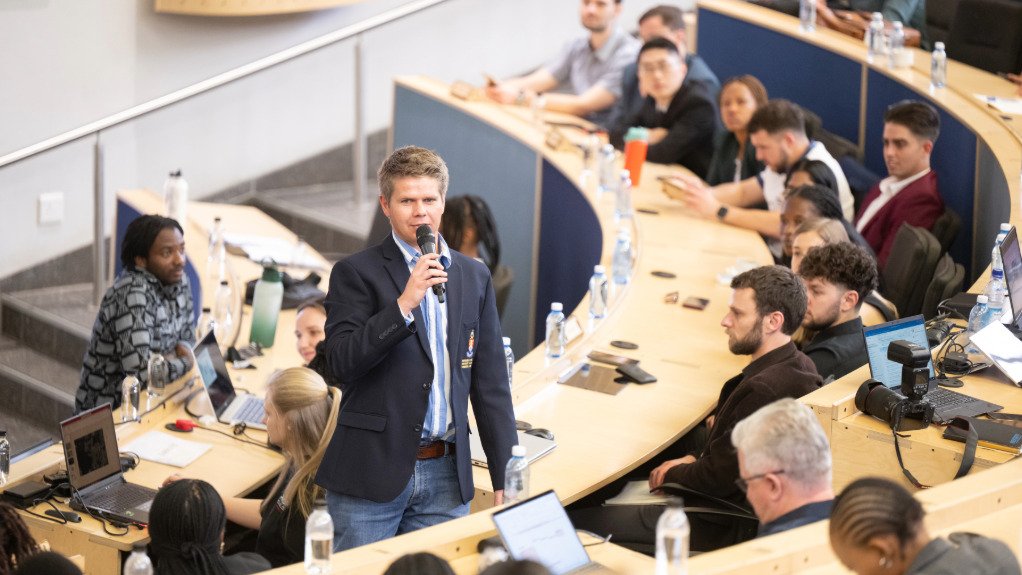ESG adoption driven by climate change


ADDRESSING THE ISSUE Professor Schalk Grobbelaar says government and the private sector can align more effectively by ensuring policy certainty
Climate change is accelerating environmental, social and governance (ESG) adoption by pushing companies to view sustainability as a source of competitiveness, consistent with the Ecological Modernisation Theory (EMT), says University of Pretoria’s (UP’s) Graduate School of Technology Management associate professor Schalk Grobbelaar.
EMT, he explains, is a perspective that suggests environmental challenges can be addressed through technological advancements, economic development and policy and institutional improvements.
“Rather than treating environmental responsibility as a cost, EMT suggests it can drive innovation, efficiency and long- term growth,” he adds.
Consequently, ESG frameworks are becoming essential for organisations to manage climate-related risks, secure investment, comply with evolving regulations and build resilience in a low-carbon economy.
“This shift emphasises that aligning business strategy with sustainability is no longer optional, but a prerequisite for competitiveness in global and national markets.”
Grobbelaar stresses that government and the private sector can align more effectively by ensuring policy certainty, adding that “stable, transparent regulations on carbon pricing, disclosure and renewable energy create the confidence that businesses need to invest in low-carbon technologies and ESG initiatives.”
One of the most notable and recent government reforms involved increasing the licensing threshold for embedded generation projects managed by the National Energy Regulator of South Africa (Nersa).
In 2021, this threshold was raised from 1 MW to 100 MW and, in 2022, the licensing requirement was eliminated.
This development allows companies to undertake large-scale renewable-energy projects without requiring a licence, provided they register with Nersa.
“Consequently, mining operations, manufacturers and property developers can directly invest in their energy supply.”
Additionally, revisions to environmental- impact assessment (EIA) regulations, the introduction of renewable-energy development zones and strategic transmission corridors have also increased private-sector interest in renewable-energy solutions and/or generation.
The projects within these zones benefit from a more streamlined approval process, with some cases exempted from needing a full EIA, presenting significantly reduced approval times from several years to just a few months.
These reforms, along with the unbundling of State-owned power utility Eskom, play a crucial role in attracting private investment by reducing barriers, enhancing policy certainty and accelerating the deployment of renewable- energy projects.
UP Projects
Grobbelaar highlights the Climate, Land, Agriculture, and Biodiversity (CLAB-Africa) project, which is a Future Africa initiative, led by UP, and hosted under its African Research Universities Alliance Centre of Excellence in Sustainable Food Systems.
CLAB-Africa aims to provide a platform for Africa’s scientific community to contribute to the developmental work of African governments and development institutions in the form of science-based, actionable recommendations within four identified clusters.
In 2022, AgResearch, operating through its business unit, the New Zealand Agricultural Greenhouse Gas Research Centre and funded by the New Zealand Ministry for Primary Industries, initiated a partnership with Future Africa at UP.
Within this collaboration, Grobbelaar explains, the Global Greenhouse Gas Measurement Project was conceived and implemented by the Future Africa Chair in Sustainable Food Systems.
Besides the projects undertaken by UP, Grobbelaar notes that a few South African private-sector projects have made good headway in driving ESG initiatives.
He cites energy company Seriti Resources’ renewable-energy subsidiary Seriti Green Energy, which seeks to reduce emissions from mining operations, manage energy cost and reliability risk, and respond to stakeholder/ESG pressure, while aligning more closely with the evolving regulatory environment.
Meanwhile, in the public sector, Grobbelaar cites the Buffelsdraai Landfill Site Community Reforestation Project, implemented by eThekwini municipality, which has created a buffer zone around a landfill by restoring an indigenous coastal forest and replacing the former sugarcane fields and invasive alien plant species.
Taking Stock
Grobbelaar notes that the JSE and leading corporates have initiated several measures to respond to climate change through ESG.
The JSE launched its voluntary Sustainability Disclosure Guidance in June 2022 to support more consistent and transparent reporting processes for ESG.
The JSE also launched the Voluntary Carbon Market under JSE Ventures to further accelerate climate-aligned finance.
“This is designed to catalyse carbon offset projects across South Africa and Africa, providing high-quality credits for companies pursuing net-zero pathways,” he says.
On the corporate side, renewable-energy platform Discovery Green and JSE-listed synthetic fuels and chemicals company Sasol have partnered to launch Ampli Energy, a renewable-energy platform that enables South African businesses of all sizes to access clean power.
These initiatives illustrate how climate change is no longer peripheral but central to ESG adoption in South Africa, aligning with a broader global trend where investors, regulators and customers demand credible action on climate risks.
Grobbelaar stresses that educational institutions such as UP play an essential role by combining teaching, research and industry collaboration to advance climate awareness and sustainable practices.
He cites, for example, the York Timbers Chair in Wood Structural Engineering, which focuses on developing timber-based construction solutions that support decarbonisation and the circular economy, while training engineers and architects in sustainable design.
Article Enquiry
Email Article
Save Article
Feedback
To advertise email advertising@creamermedia.co.za or click here
Announcements
What's On
Subscribe to improve your user experience...
Option 1 (equivalent of R125 a month):
Receive a weekly copy of Creamer Media's Engineering News & Mining Weekly magazine
(print copy for those in South Africa and e-magazine for those outside of South Africa)
Receive daily email newsletters
Access to full search results
Access archive of magazine back copies
Access to Projects in Progress
Access to ONE Research Report of your choice in PDF format
Option 2 (equivalent of R375 a month):
All benefits from Option 1
PLUS
Access to Creamer Media's Research Channel Africa for ALL Research Reports, in PDF format, on various industrial and mining sectors
including Electricity; Water; Energy Transition; Hydrogen; Roads, Rail and Ports; Coal; Gold; Platinum; Battery Metals; etc.
Already a subscriber?
Forgotten your password?
Receive weekly copy of Creamer Media's Engineering News & Mining Weekly magazine (print copy for those in South Africa and e-magazine for those outside of South Africa)
➕
Recieve daily email newsletters
➕
Access to full search results
➕
Access archive of magazine back copies
➕
Access to Projects in Progress
➕
Access to ONE Research Report of your choice in PDF format
RESEARCH CHANNEL AFRICA
R4500 (equivalent of R375 a month)
SUBSCRIBEAll benefits from Option 1
➕
Access to Creamer Media's Research Channel Africa for ALL Research Reports on various industrial and mining sectors, in PDF format, including on:
Electricity
➕
Water
➕
Energy Transition
➕
Hydrogen
➕
Roads, Rail and Ports
➕
Coal
➕
Gold
➕
Platinum
➕
Battery Metals
➕
etc.
Receive all benefits from Option 1 or Option 2 delivered to numerous people at your company
➕
Multiple User names and Passwords for simultaneous log-ins
➕
Intranet integration access to all in your organisation


















